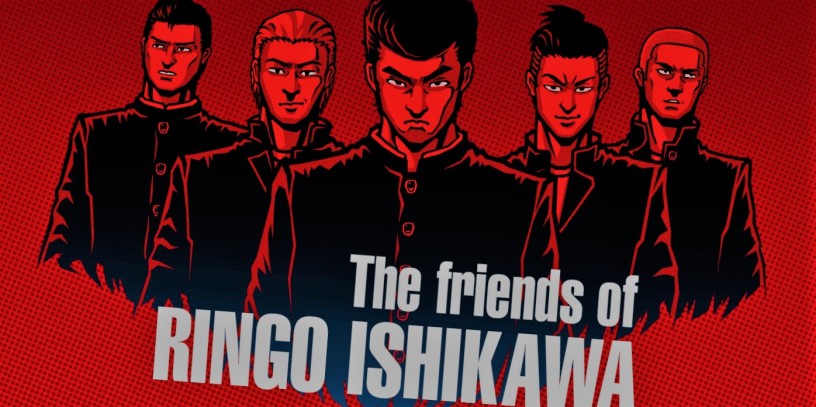cw: suicidal ideation, depression
–
The Friends of Ringo Ishikawa is a relatively short yet re-playable game about how far friendships can be stretched, how many beatings a man can take, and how we stack the deck against ourselves and pretend not to notice.
This game pushes Ringo into a poverty-induced whirlpool of violence and crime, as the only way to afford food in the early game (apart from when your friend, seemingly at random, shells out for you) is by either beating the yen right out of other dudes’ pockets, or by opportunistically scavenging coins from the unconscious forms of fallen gang members who you just watched get pounded into the dirt. In this way, you become a wild animal, a crow picking at scraps upon city pavements, consuming barely substantial crumbs one fingerful at a time.
Ringo doesn’t have parents. Nobody in the adult world seems especially interested in taking care of him, beyond coaches who, you’ve guessed it, train him to be a better fighter. Ringo’s teacher will present him with lump sums of yen every week if he gets good grades, and he will verbally encourage Ringo, yet this too implicitly rewards those who fight and scavenge on the street; to focus on school and to study effectively at home, Ringo must surely have a full belly, and in order to achieve a full belly, he must roam the city in search of other gang members to steal from. In the early game, I found myself caught in a cycle in which I lost multiple fights in a row, wasted a lot of days recovering in bed, and was always starving. I expected to receive a game over, but it didn’t come. Ringo Ishikawa always got back up, no matter how I failed him, no matter how very hungry he claimed to be.
When I was a teenager, I didn’t get into fights. I didn’t smoke. I didn’t drink. I certainly wasn’t left to fend for myself, without parents, money, or food—not for any extended period of time, anyway. However, when I was about sixteen or seventeen, I went through a phase where I struggled to eat. Looking at food made me feel sick. Looking at myself made me feel sick. I replaced breakfast with extra time in bed, which helped ease the sleepless nights. I was recurrently dehydrated. I could eat lunch only on days where I could successfully separate my mind from my mouth and my organs. I had a much easier time with evening meals, though I don’t know why, and not always.
I was hungry a lot. Hungry, and empty.
I remember feeling like I was self-destructing. I often hoped that somebody might jump me on the way home in the dark, like getting into a fight might fix everything, but I wasn’t an initiator, and for whatever reason nobody initiated against me. I had become a ghost, I thought. One night, during the winter, I was looking out at the river that sliced the town in two. I thought about jumping into it from the bridge above. I hoped the shock of the cold might be enough to make me panic and drown. If not, at least it would make me feel something. Suddenly, a man I didn’t know appeared behind me, and said something about it being a nice night. This startled me. I was crying. Silently, I think, though I couldn’t be certain. I tentatively agreed with him. It was a nice night. Freezing cold, crystal clear. I…
Ringo Ishikawa is not a ghost. I don’t believe that he can become depressed. I don’t know if he can starve to death, though I don’t think he can. He can initiate fights and have fights initiated against him. No matter how bad his previous day was, he will sit down at a school bench, if instructed, and read classic literature for you—literature that was, and still is, too intimidating for me to read, regardless of the fullness of my stomach and the health of my bank account, and in spite of my degrees in writing and literature.
All that to say, this game did and did not make me feel like a teenager again.
–
You can click here to keep up with me on Twitter, here for goodreads, and here for Instagram.
